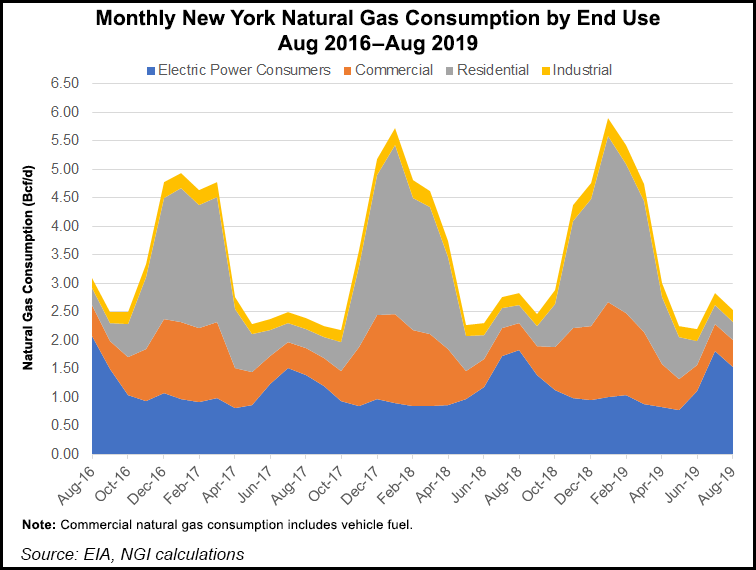Infrastructure | NGI All News Access
New York Natural Gas Utilities Facing Credit Risks, Says Moody’s
Moody’s Investors Service said this week New York Gov. Andrew Cuomo’s intention to potentially revoke National Grid’s operating certificate unless it ends a New York City moratorium on new natural gas service is “credit negative” for all of the state’s investor-owned utilities.

A strongly worded letter Cuomo sent to National Grid last week in his ongoing battle with the utility regarding a moratorium “signals a heightened willingness by the governor’s office to intervene in utility regulation,” the credit analyst firm said.
The intervention creates higher business risk for all utilities in the state, but particularly for Consolidated Edison Co. and New York State Electric & Gas Corp., which have similar moratoriums in place because of a natural gas supply shortage, which Cuomo and environmental groups have said is a fabrication.
In the letter sent on Nov. 12, Cuomo gave National Grid 14 days to outline “meaningful and immediate remedial actions” to end the moratorium. National Grid stopped processing applications for new gas service earlier this year, indicating that it couldn’t serve commercial, residential and multi-family units without additional infrastructure to bring more supply into New York City. The moved stopped 2,600 applications and impacted an estimated 20,000 people, National Grid said.
The moratorium stirred the ire of the business community and politicians, which prompted a New York State Public Service Commission order requiring National Grid to connect service for 1,100 customers in Brooklyn, Queens and Long Island, which the utility is working to accomplish.
Cuomo accused the utility of failing to plan for supply needs and depending too heavily on Transcontinental Gas Pipe Line Co. LLC’s Northeast Supply Enhancement (NESE) project, which is fully subscribed by National Grid subsidiaries. However, both New York and New Jersey have rejected key permits for the pipeline, preventing it from advancing.
“The situation for New York’s utilities highlight important environmental and social considerations that are embedded in the gas supply issue,” Moody’s analysts said in the note. “These considerations include environmental risks associated with carbon dioxide regulations, social risks associated with customer relations, responsible production, and, to a lesser degree, health and safety, and governance risks associated with financial strategy, and risk management, as well as management credibility and track record.”
Over the summer, New York passed one of the most aggressive climate protection bills in the country, while Cuomo has indicated he favors alternative energy over natural gas. His administration has stymied other pipeline projects and banned hydraulic fracturing.
Moody’s warning also comes as National Grid faces increasing pressure. In an earnings call last week, National Grid CEO John Pettigrew acknowledged that New York Attorney General Letitia James has been taking consumer complaints as part of an ongoing investigation into the company.
Cuomo noted in his letter that a utility is granted a certificate of public convenience and necessity only if it can provide “adequate and reliable service” and the utility’s operation is “in the public interest.”
Pettigrew countered by saying that the state is unlikely to revoke National Grid’s certificate as the move “is for circumstances where there have been multiple violations of regulations or rules, of which this isn’t applicable.” He added that there are no issues concerning safety or reliability that would warrant a termination of the utility’s franchise in the state.
National Grid has said previously it would better manage the supply shortage by expanding demand response and energy efficiency programs. Pettigrew said last week during the call with financial analysts that the company is working through a number of different “non-pipeline” solutions.
“So, for example, as we’re looking at things like energy efficiency and demand side management, we’re looking at things like compressed natural gas, vaporization, increased capacity on our” liquefied natural gas facilities, “there are a whole host of engineering solutions that we need to work through,” he said. “Ultimately, our objective is to be able to serve the customers.”
Pettigrew said he’s confident the company can satisfy the state’s demands in the timeline Cuomo has put forward. However, he noted that the costs associated with the supply alternatives would be passed through to consumers.
© 2024 Natural Gas Intelligence. All rights reserved.
ISSN © 1532-1231 | ISSN © 2577-9877 |
